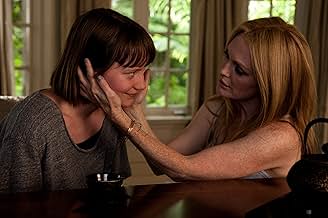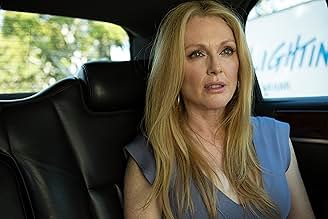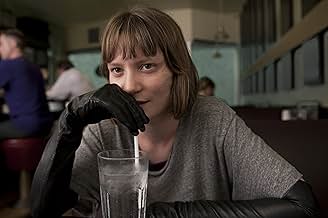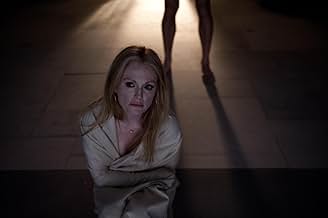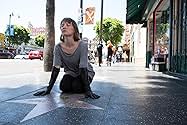IMDb-BEWERTUNG
6,2/10
43.993
IHRE BEWERTUNG
Eine Tour in das Herz einer Hollywood-Familie, die sich gegenseitig und den unerbittlichen Geistern ihrer Vergangenheit nachjagt.Eine Tour in das Herz einer Hollywood-Familie, die sich gegenseitig und den unerbittlichen Geistern ihrer Vergangenheit nachjagt.Eine Tour in das Herz einer Hollywood-Familie, die sich gegenseitig und den unerbittlichen Geistern ihrer Vergangenheit nachjagt.
- Auszeichnungen
- 10 Gewinne & 24 Nominierungen insgesamt
Empfohlene Bewertungen
If you've seen any of David Cronenberg's movies, then you should know that his movies contain some nasty material. "Maps to the Stars" is no exception, but this one features a different kind of nastiness. Cronenberg's previous movies showed things like mutated children, exploding heads, a man turning into a fly, a drug addict's hallucinations, and the revelation of a family man's former occupation. "Maps to the Stars" features a scene that looks very much like a scene in a Cronenberg movie, but most of the violence here is emotional violence. Every character is REALLY screwed up. That's to be expected in a movie about Hollywood, but Julianne Moore's character is like a knife against your face.
In the end I thought that it was a good movie, but not a great one. The whole movie is like a kick in the gut, so I should remind you that it's not for the fainthearted (no Cronenberg movie is).
In the end I thought that it was a good movie, but not a great one. The whole movie is like a kick in the gut, so I should remind you that it's not for the fainthearted (no Cronenberg movie is).
We used to expect gross-out horror from David Cronenberg. Now he gives us weird and weirder. MAPS TO THE STARS is set in a Tinseltown of designer homes, designer shops and exclusive restaurants. The background 'sheen' is reminiscent of an Almodovar movie, plus there's a Gothic element borrowed from Shyamalan (Agatha and Benjie see dead people). Julianne Moore's performance is in the kind of hyper-drive she brought to BOOGIE NIGHTS, which helps to power the movie's gearshift from Hollywood satire into violent melodrama. One of the themes is incest, which surely needed a deeper and subtler exploration.
Robert Pattinson takes another step away from the Twilight Zone in the role of a limo driver with screen writing aspirations (like every other chauffeur in Los Angeles). Cronenberg is clearly reaching out towards a more discerning class of viewer. MAPS TO THE STARS is very much an 'auteur' movie, highly intelligent and stylized, but perhaps perched uncomfortably between satire and psychodrama.
Robert Pattinson takes another step away from the Twilight Zone in the role of a limo driver with screen writing aspirations (like every other chauffeur in Los Angeles). Cronenberg is clearly reaching out towards a more discerning class of viewer. MAPS TO THE STARS is very much an 'auteur' movie, highly intelligent and stylized, but perhaps perched uncomfortably between satire and psychodrama.
By no stretch of the imagination do I think that this is a home run. Not at all. It's very messy, and many times each storyline strains to connect. However, there's still a sense of real fascination under it all. Messy, but also very interesting at times. If anything, the film would have worked more if the performances were more in-line with the obviously funny material at the core. The one actor to truly get it is Julianne Moore, who is easily the best performer here. She seems to have a helluva time, funny and wickedly offbeat, even if over-the-top in a way that works. She really does rise the film above what the script entails. Great performance
A film worth revisiting, if my experience is anything to go by. I didn't think it was up to much the first time, but the BBC put it on again and this time I watched it twice and probably will at least once more, partly for Julianne Moore, who's pretty astonishing, playing an almost unprecedentedly monstrous grotesque, and partly for the frequent patches of brilliantly written dialogue (take a bow, Bruce Wagner). Moore's dialogue is almost always good, but that of 13-year-old move star and recovering drug abuser Benji also packs a vicious punch, and elsewhere, more subtly, in the mouths of Mia Wasikovska and Robert Pattinson's characters, Wagner does probably the best depiction I've ever seen of how young adults actually talk a lot of the time: confused, insecure and just barely covering it up.
All this is something like what we might see - and most importantly hear - if anyone ever filmed a Brett Eason Ellis novel properly, without being afraid of going to town on the dialogue (why hasn't Cronenburg ever worked with Ellis?). As such, it's an interesting point of comparison with Cronenburg's previous film, Cosmopolis, also heavy on the chilly, anomic modern rich person dialogue, courtesy of Don de Lillo, which, taken on its own, looks like woefully pretentious proof that you can't do this in film. Turns out you can, with bells on, though actually, Cronenburg films have been demonstrating this at least since Dead Ringers.
Other than these talky highlights, I think this film has a few problems of its own, some of them maybe also around pretentiousness. The big one for me is just the messiness of the message and plot, as a unity, which it isn't really. Moore's storyline on its own is a perfect, pitilessly poisonous Hollywood satire. Does it really need, in addition, a parallel plot that never quite meshes about incest and schizophrenia? Why? To round it out to feature film length? To give it some spurious intellectual heft in the form of references to Greek tragedy and elemental symbolism?
To be honest, there may be a puzzle here that I haven't worked out, because quite a lot of that dialogue I like so much seems to be satirising precisely such tendencies, particularly when Moore's character ghoulishly invokes fire and water to implicitly celebrate the death of a child because it gets her a part. And that's another reason I might watch again. But still, the problem remains, I don't think you need the incest or the schizophrenia to satirise Hollywood, because it introduces a sort of separate issue, a distinct emotional antagonist if you will, where Hollywood itself seems like the real target and should surely be all you need to explain all this very bad behaviour.
All this is something like what we might see - and most importantly hear - if anyone ever filmed a Brett Eason Ellis novel properly, without being afraid of going to town on the dialogue (why hasn't Cronenburg ever worked with Ellis?). As such, it's an interesting point of comparison with Cronenburg's previous film, Cosmopolis, also heavy on the chilly, anomic modern rich person dialogue, courtesy of Don de Lillo, which, taken on its own, looks like woefully pretentious proof that you can't do this in film. Turns out you can, with bells on, though actually, Cronenburg films have been demonstrating this at least since Dead Ringers.
Other than these talky highlights, I think this film has a few problems of its own, some of them maybe also around pretentiousness. The big one for me is just the messiness of the message and plot, as a unity, which it isn't really. Moore's storyline on its own is a perfect, pitilessly poisonous Hollywood satire. Does it really need, in addition, a parallel plot that never quite meshes about incest and schizophrenia? Why? To round it out to feature film length? To give it some spurious intellectual heft in the form of references to Greek tragedy and elemental symbolism?
To be honest, there may be a puzzle here that I haven't worked out, because quite a lot of that dialogue I like so much seems to be satirising precisely such tendencies, particularly when Moore's character ghoulishly invokes fire and water to implicitly celebrate the death of a child because it gets her a part. And that's another reason I might watch again. But still, the problem remains, I don't think you need the incest or the schizophrenia to satirise Hollywood, because it introduces a sort of separate issue, a distinct emotional antagonist if you will, where Hollywood itself seems like the real target and should surely be all you need to explain all this very bad behaviour.
Daivd Cronenberg's 'Maps to the Stars' tells the convergent stories of several different characters in Hollywood: at first it appears as if this is one of those films about discrete lives that form a fine web of faint touches, but in fact it turns out that (most) of the characters have serious history, and are coming back together after events that have driven them apart. This reveal is quite well-plotted; the problem is that the characters are all mostly nasty (or at the very least weird), and moreover are so in a uniquely Hollywood way - you can believe there are such people in and around the movie business, but they're simply not the sort of people that most of us meet in our everyday lives. This makes it quite hard to sympathise with them, even if we can see the reason for their meanness and oddness. Cronenberg's movies can be considered cold in general, and although the charge isn't always justified, I watched this one very much from the outside. One thing it isn't, in spite of its billing as such, is a comedy.
Wusstest du schon
- WissenswertesAccording to screenwriter Bruce Wagner, the casting of Robert Pattinson was what finally got the movie made, financially speaking.
- PatzerWhen Jerome is driving Havana, they are in a long wheelbase 'L' version of Lincoln Town Car, when they've arrived at her house and are having sex in the back, they are in a standard wheelbase version (it has a shorter quarter glass section in the rear door window).
- Zitate
Agatha Weiss: [Agatha recites poetry from Paul Éluard's poem, Liberty, translated from French] On my school notebook, on my desk and the trees, on the sand and the snow, I write your name. On all the flesh that says yes, on the forehead of my friends, on every hand held out, I write your name. Liberty.
- VerbindungenFeatured in Renegade Cut: Maps to the Stars (2015)
- SoundtracksNa Na Hey Hey Kiss Him Goodbye
Written by Gary DeCarlo,Paul Leka and Dale Frashuer
Performed by Julianne Moore and Mia Wasikowska
Top-Auswahl
Melde dich zum Bewerten an und greife auf die Watchlist für personalisierte Empfehlungen zu.
- How long is Maps to the Stars?Powered by Alexa
Details
- Erscheinungsdatum
- Herkunftsländer
- Offizieller Standort
- Sprache
- Auch bekannt als
- Mapa a las estrellas
- Drehorte
- Produktionsfirmen
- Weitere beteiligte Unternehmen bei IMDbPro anzeigen
Box Office
- Budget
- 15.000.000 $ (geschätzt)
- Bruttoertrag in den USA und Kanada
- 350.741 $
- Eröffnungswochenende in den USA und in Kanada
- 143.422 $
- 1. März 2015
- Weltweiter Bruttoertrag
- 4.510.934 $
- Laufzeit
- 1 Std. 51 Min.(111 min)
- Farbe
- Sound-Mix
- Seitenverhältnis
- 1.85 : 1
Zu dieser Seite beitragen
Bearbeitung vorschlagen oder fehlenden Inhalt hinzufügen







